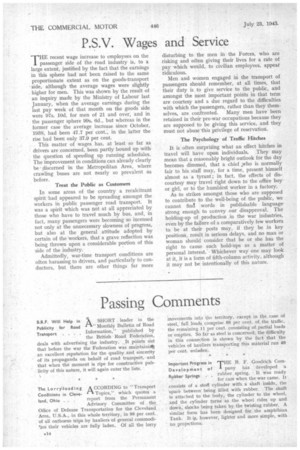P.S.V. Wages and Service T HE recent wage increase to employees
Page 16

If you've noticed an error in this article please click here to report it so we can fix it.
on the passenger side of the road industry is, to a large extent, justified by the fact that the earnings in this sphere had not been faised to the same proportionate extent as on the goods-transport side, although the average wages were slightly higher for men. This was shown by the result of an inquiry made by the Ministry of Labour last January, when the average earnings during the last pay week of that month on the goods side were 97s. 10d. for men of 21 and over, and in the passenger sphere 99s. 6d., but whereas in the former case the average increase since October, 108, had been 47.7 per cent:, in the latter the rise had been only 37.9 per cent.
This matter of wages has, at least so far as drivers are concerned, been partly bound up with the question of speeding up running schedules. The improvement in conditions can already clearly bediscerned in the Metropolitan Area, where crawling buses are not nearly so prevalent as before.
Treat the Public as Customers In some areas of the country a recalcitrant spirit had appeared to be spreading amongst the workers in public passenger road transport. It was a spirit which was not at all appreciated by those who have to travel much by bus, and, in fact, many passengers were becoming so incensed not only at the unnecessary slowness of progress, but also at the general attitude adopted by certain of the workers, that a grave reflection was being thrown upon a considerable portion of this side of the industry.
Admittedly, war-time transport conditions are often harassing to drivers, and particularly to conductors, but there are other things far more disturbing to the men in the Forces, who are risking and often giving their lives for a rate of pay which would, to civilian employees, appear ridiculous.
Men and women engaged in the transport of passengers should remember, at all times, that their duty is to give service to the public, and amongst the most important points in that term are courtesy and a due regard to the difficulties with which the passengers, rather than they themselves, are confronted. Many men have been retained in their pre-war occupations because they are supposed to be giving this service, and they must not abuse this privilege of reservation.
The Psychology of Traffic Hitches It is often surprising what an effect hitches in travel will have upon individuals. They may mean that a reasonably bright outlook for the day becomes dimmed, that a chief who is normally fair to his staff may, for a time, present himself almost as a tyrant ; in fact, the effects of discourtesy may travel right down to the office boy or girl, or to the humblest worker in a factory.
As to strikes amongst those who are supposed to contribute to the well-being of the public, we cannot find words in publishable language strong enough to convey our disapproval. The holding-up of production in the war industries, even by the failure of a comparatively few workers to be at their posts may, if they be in key positions, result in serious delays, and no man or woman should consider that he or she has the right to cause such hold-ups as a matter of personal interest. • Whichever way one may look at it, it is a form of fifth-column activity, although' it may not be intentionally of this nature.




















































